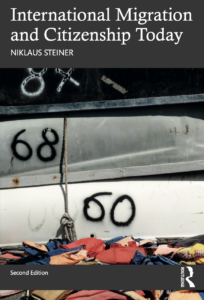CHECK OUT MY NEW BOOK,
WHICH YOU CAN ORDER HERE!

This completely revised and updated textbook explores the moral, economic, political, and cultural dimensions of the movement of people across international borders. In style and substance, this book is designed to spark thoughtful discussions and to challenge students to draw their own conclusions to questions such as: How should democracies balance the rights of immigrants with those of citizens? What exactly constitutes persecution and how should we define a refugee? How should democracies allocate citizenship? Can and should a distinction between voluntary and forced migration be made, and does one group of migrants deserve admission more than the other? What does a reasonable border policy look like? The rise of populism, the vote for Brexit, and the unprecedented flow of refugees around the world are all evidence that these questions remain highly salient, controversial, and unresolved.
The content has been thoroughly updated to cover:
- Migration into Europe since 2014.
- Climate change as a driver of migration and the concept of environmental refugees.
- Unaccompanied minors fleeing gang violence, asylum for victims of domestic violence, family separation policies and the building of a wall on the U.S./Mexican border.
- The controversies surrounding the Danish cartoons, Charlie Hebdo,and hijabs as examples of the tensions in liberal democracies between free speech, individual freedom, religious expressions and minority rights.
- The DREAM Act and Deferred Action for Childhood Arrivals (DACA).
- Demographic shifts and the debates around multiculturalism and diversity.
- Guest worker programs as alternatives to admitting immigrants.
Intended as the main text for undergraduate classes on international migration the book will also appeal to broad survey courses on world politics, comparative politics, international relations, global history and more specialized courses on human rights, citizenship and nationalism.
International Migration and Citizenship Today is concrete, engaging, and accessible. It provides an excellent introduction to the issues raised by migration.
Joseph H. Carens, Professor Emeritus of Political Science, University of Toronto
A thoughtful and thought-provoking guide to immigration issues in liberal democracies. The book doesn’t shy away from the uncomfortable or contradictory impulses surrounding admissions policies, integration, or economic and political impacts but points to the importance of a civil debate based on solid information and values. Steiner equips the reader to take part in that very consequential debate.
Kathleen Newland, Co-founder and Senior Fellow, Migration Policy Institute
This timely book clearly articulates the central paradox of the migration debate in liberal democracies – how to control potentially disruptive migration flows while still upholding the central tenets of liberalism. The book brings nuanced and insightful perspectives to this question that has made migration a defining issue in the twenty-first century. Scholars, practitioners, and policymakers will find the approaches offered in this book thoughtful, engaging, and compelling.
Bonny Ibhawoh, Senator William McMaster Chair in Global Human Rights, McMaster University, and Expert-Rapporteur, UN Expert Mechanism on the Right to Development
Steiner’s freshly updated textbook will confront you with many astonishing facts and figures—and equip you with a much-needed nuanced and thought-provoking perspective on migration. Steiner’s excellent book offers an indispensable resource for academics, students, politicians, practitioners, policy-makers, and ordinary citizens alike; preparing readers to more effectively respond to one of the most vexing and most pressing issue of our time.
Adrian Vatter, Professor of Political Science, University of Bern, Switzerland
Steiner has produced the ideal textbook for classes that deal with the assortment of migration issues now facing Western democracies, as well as those that will come. The book is extraordinarily comprehensive in terms of its comparative analysis of how states have responded to the ever increasing levels of international migration. However, perhaps its greatest strength is the way it pushes and prods the reader by raising issues that will challenge those on both the political left and right. Quite simply, this is a wonderful achievement.
Mark Gibney, Belk Distinguished Professor of Humanities and Professor of Political Science, University of North Carolina at Asheville